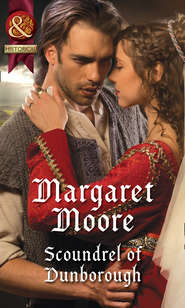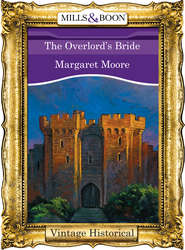По всем вопросам обращайтесь на: info@litportal.ru
(©) 2003-2024.
✖
The Baron's Quest
Настройки чтения
Размер шрифта
Высота строк
Поля
“Goodbye, Gabriella Frechette,” Baron DeGuerre said before he turned on his heel and strode toward the hall, clearly convinced by her stunned silence he had won this skirmish. The other knight who had remained smiled cruelly and followed his master into the hall like a dog on a lead.
Gabriella stood in the courtyard all alone, feeling more abandoned than she had by her father’s death and even Bryce’s absence.
If she stayed, she would have to be a maid, humbled before the servants and tenants she had known all her life, the very people she had been raised to believe she had a duty to protect.
Was it so humiliating to be a servant? Had her father not praised many times the labor of his people and the worth of his hirelings who had built this place? Was it worse than being driven from her home?
The Frechettes were not cowards. This was her family’s home and had been for generations; Baron DeGuerre could not force her to leave, however he tried. Besides, there was the very real chance that Bryce would return one day, and who could say what might happen if she were not there? She could not count on Baron DeGuerre or Robert Chalfront to tell her brother where she had gone.
Also, as the baron surely knew—to his discredit—it would be too dangerous for a woman with no money and no escort to travel. She would quickly find herself in a worse predicament, and at the mercy of villains even more loathsome than the baron.
If she remained, she might yet be able to help her people. Clearly the tenants would need any and all assistance she might render.
If she fled, that would allow the baron to think he had triumphed over her.
Therefore, there really was only one thing she could do. She must stay.
With the fierce pride in her family name to sustain her, Gabriella turned on her heel and marched to the kitchen.
Despite what had passed in the courtyard, the room was abustle with preparations for the evening meal, a feast she herself had ordered and that would use the last of the stores her father had purchased. Both she and the cook had wanted this meal to make them proud, if for slightly different reasons. She had thought of her family’s honor; Guido wanted to retain his position by impressing his new master.
One of the maids spotted Gabriella and gasped, her mouth an “O” of surprise as she colored Then the others realized who was in their midst and there was an awkward pause before Guido came toward her with outstretched, floury hands.
“My lady!” he cried, his Italian accent strong because of his indignation. “This is a terrible business! The baron is no gentleman! Sit here.” He indicated a pile of bags filled with flour.
Gabnella smiled, sure again of their affection and that she had made the right decision. “No, Guido,” she said, “if I am to be a servant, I had better begin to work.”
The other servants exchanged shocked glances. “My lady!” James the baker began. “Your sainted mother—”
“Is mercifully in her grave,” Gabriella said, subduing a pang of sorrow. “The baron has given his ultimatum and I have made my choice, with no regrets. Now,” she continued briskly, “have the flowers been spread upon the tables yet?”
“No, my lady,” a girl named Alda replied quietly, nodding toward cut stems of late-blooming campion.
“Very well,” Gabriella said. “I will do that.” She picked up the flowers and headed toward the corridor leading to the great hall.
“Alda, you help her,” Guido ordered, and Gabriella heard the respect in his voice.
It made her feel...good. Before, they had always deferred to her, but never had she been so aware of their respect. This time, too, it was not because she was her parents’ daughter, but for herself alone.
As she waited for Alda to gather together more flowers and join her, Guido went back to peering into a bubbling pot, like an alchemist waiting for lead to turn to gold, and the spit boy turned an enormous boar as if the fate of the kingdom rested on the performance of his duty. James fussed over the exact shape of the sweetmeats, but paused to give her a genial smile.
And the baron thought she would leave!
During the evening meal, Etienne DeGuerre permitted himself a very small and very rare smile of satisfaction. The king had not lied when he said that while the Earl of Westborough was not a fighting man, he was no fool when it came to the building of defenses. This castle was as strong as any fortress Etienne had ever seen. The outer curtain wall was nearly twenty feet tall, and over two yards wide. The inner wall was even taller and wider, built to allow archers to protect or defeat any soldiers caught between the two. The gate house was nearly as large as the stables, and well fortified with an oak portcullis tipped with iron in front of a heavier solid oak door strengthened by iron straps. Above and behind the portcullis was the murder hole, through which stones or boiling oil could be poured, the bane of any enemy trapped between the portcullis and the outer door.
The late earl also had a canny eye for picking a good location. The castle had been built on a low rise at the meeting of two rivers, a spot of unmistakable strategic significance. If the decorations were rather lavish, that was something new in Etienne’s experience, and he found them not unpleasant. For so many years he had survived with the barest of necessities; the external beauty of this fortress seemed to say that all those years of struggle were finally behind him. Not that he could rest content even now, he thought, watching Philippe de Varenne talk to George.
The young knight was an ambitious braggart and a bully, but he was from a wealthy family of great rank, and Etienne didn’t doubt that the man would soon leave his company for a lord with more to give. That being so, he was willing to tolerate Philippe’s presence—especially since Philippe was free with his money and often paid for meals in taverns for himself and his friends, thereby sparing the baron’s larder.
George was a good and loyal knight, if a trifle indifferent to everything except his clothing and being the wittiest man in any hall. He could be counted on in a fight, if necessary; however, more often than not he prevented the others from expressing their disagreements physically.
In contrast, Donald Bouchard, from a poor but ancient family, was rather too serious. That surely came from his training under the strict eye of Urien Fitzroy, a teacher becoming famous from his students’ skills and moral rectitude.
Seldon Vachon had profited immensely from Fitzroy’s guidance. Etienne knew the young man’s family, a bunch of brawling braggarts. Thanks to Donald’s steadfast friendship and Fitzroy’s example, Seldon was a fine exception to his family’s reputation.
The other knights and squires were all rather similar, each ambitious and anxious to please their overlord by distinguishing themselves. Some were rich, some were poor, but all wanted more, whether it was wealth, power or fame. All expected to achieve those ends by associating with Etienne DeGuerre.
He did not begrudge them their aspirations, for he, too, had harbored similar ones himself—as long as they did not try to succeed to his detriment.
As his gaze returned to the interior of the great hall, Etienne noticed at once the discrepancy between the beautiful carving on the door frame and hearth, the polished paneling and painted walls, and the meager nature of the furnishings. Surely other, more lavish trappings had been sold to pay off the bulk of the earl’s several debts. However, with some initial expenditure and Josephine’s exquisite taste, this hall would soon be a showplace for his wealth and power.
Already he detected Josephine’s touch in the flowers upon the table. He turned to her, pleased as always to think this beautiful creature was his and that men envied him all the more because of her. “Wherever did you find the flowers?”
His mistress gave him a surprised look. “That was none of my doing, Etienne,” she replied in her soft, dulcet tones. “I was too busy seeing to our baggage. Some of the servants must have done it.”
“Ah. No matter.” Etienne reached forward to take another piece of bread and allowed himself to enjoy the extravagant feast. It would be quite some time before he would authorize such a meal, so he might as well indulge at the late earl’s expense.
The bread was excellent, the meat spiced to perfection, the fruit fresh and the pastries light, proving that the late earl had an excellent cook, and that the victualing of this castle had not been done with an eye to expense. The servants did their jobs quickly and competently; obviously, they had been well trained.
What a place this must have been when the earl and his wife were still alive and wealthy! It was easy to imagine the luxury, the bustle, the many guests, the music and laughter. Easy, too, to envision a spoiled daughter unaware of the change about to befall her. But that was not his concern.
How different from the wattle and daub building that had been his lonely childhood home, presided over by his bitter, domineering mother, the only guest being the memories of his father.
That didn’t matter now. He had risen above his past and the earl had died impoverished.
Etienne turned his mind to the other things the king had told him: the depletion of the stores caused by the late Earl of Westborough’s generosity to anyone who arrived at his gates, whether noble or the poorest of beggars; the earl’s careless treatment of illegal activity, especially poaching; the astonishing amounts of money—indeed, all that he had left in his coffers—that the earl had given to the church for masses and prayers. Not that there was much to give, after the disastrous harvest last autumn.
If Castle Frechette was a masterpiece, it was because the earl had promised his masons and carpenters lavish wages, and they had worked with a will. Unfortunately, when the true state of the earl’s debts became clear at his death, all the furnishings had been sold to pay these wages, for the work could not be taken away.
Etienne had also noted the fine state of most of the peasants’ dwellings as he had ridden toward the castle. The injustice of it had struck him immediately, that the earl should have lost his land while his tenants prospered.
He had heard, too, of the earl’s wastrel son who had left the country in a fit of pique. Perhaps the young man had not known of the sorry state of his father’s affairs, or the man’s ill health, but he should have ensured that they knew how to reach him.
Because of Bryce Frechette’s selfishness, his sister was in serious difficulty and completely alone. Yet, apparently, she did not condemn her brother for such childish behavior. Outside in the courtyard, she had been upset to hear the truth discussed in the open, in front of the tenants.
He leaned back thoughtfully, watching his men enjoy their meal. He supposed Gabriella Frechette would say, in her defiant, husky and compelling voice, that she loved her brother. It was distressing to think an otherwise formidable woman could be so blinded by an emotion.
Gabriella Frechette’s predicament was already a thing of the past. She was surely already gone, and he would be left in possession of this, his tenth estate, the number he had set himself so many years ago when he was poor, and starving and freezing in the winter’s snow. At last he had reached the end of the quest.
Etienne DeGuerre permitted himself another small, satisfied smile as he reached out to grasp his goblet. When it was halfway to his lips, he halted for a barely perceptible moment. Gabriella Frechette had just entered from the kitchen carrying a platter of meat, which she proceeded to serve to a delighted George de Gramercie.
God’s teeth! He had thought she would gather her things and be gone before an hour had passed after her public humiliation. What would possess a woman to remain after that?
A new sensation tore through Etienne, one he had not felt in years upon years. He was suddenly ashamed that he had tried to humiliate this bold and fiercely proud woman.
He quickly subdued his reaction. Obviously she was not easily humbled, nor did she fully appreciate how precarious her new position was.
His gaze flashed around the hall. The other servants were guarded and watchful, but clearly just as proud of their former lord’s daughter’s defiance as she surely was of herself.











